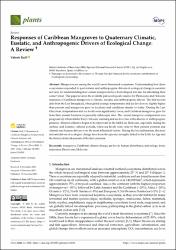/admin/item?itemID=d6032b3e-bf2d-43c9-83b9-cf7ea1e6cac9
Responses of Caribbean mangroves to quaternary climatic, eustatic, and anthropogenic drivers of ecological change : a review

View/
Type of Access
OpenMaterial Type
ArticleType of Content
Scientific researchLanguage
EnglishCollection
- Investigación ambiental [1725]
Metadata
Show full item record| Abstract: | Mangroves are among the world’s most threatened ecosystems. Understanding how these ecosystems responded to past natural and anthropogenic drivers of ecological change is essential not only for understanding how extant mangroves have been shaped but also for informing their conservation. This paper reviews the available paleoecological evidence for Pleistocene and Holocene responses of Caribbean mangroves to climatic, eustatic, and anthropogenic drivers. The first records date from the Last Interglacial, when global average temperatures and sea levels were slightly higher than present and mangroves grew in locations and conditions similar to today. During the Last Glaciation, temperatures and sea levels were significantly lower, and Caribbean mangroves grew far from their present locations on presently submerged sites. The current mangrove configuration was progressively attained after Early Holocene warming and sea level rise in the absence of anthropogenic pressure. Human influence began to be important in the Mid-Late Holocene, especially during the Archaic and Ceramic cultural periods, when sea levels were close to their present position and climatic and human drivers were the most influential factors. During the last millennium, the most relevant drivers of ecological change have been the episodic droughts linked to the Little Ice Age and the historical developments of the last centuries. |
| Author(s): | Rull, Valentí
|
| Date: | 2022 |
| Published: | Plants, 11(24), 3502 |
| Citation: | Rull, V. (2022). Responses of Caribbean mangroves to quaternary climatic, eustatic, and anthropogenic drivers of ecological change: A review. Plants, 11(24), 3502. Recuperado de: |
| URI: | https://bvearmb.do/handle/123456789/4672
|

